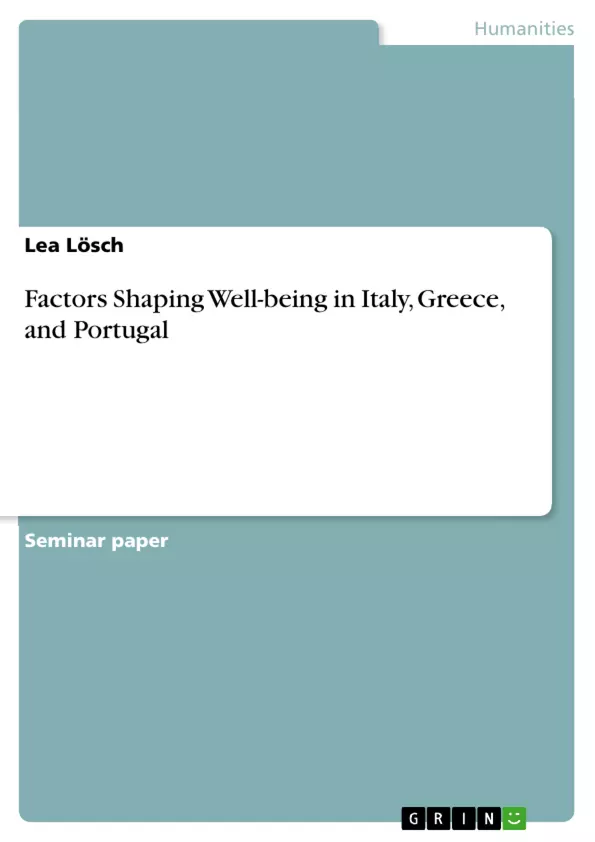This research project aims to explore the factors that contribute to the relatively low level of happiness in Italy, Greece, and Portugal, despite their high health status. By adopting a holistic and systemic approach, the study investigates nine different dimensions of well-being based on the Gross National Happiness (GNH) framework. The research utilizes simple and multiple linear regression analysis to assess the independent impact of various determinants on happiness. The variables considered include life expectancy, employment rate, educational attainment, income, good governance, feeling safe, cultural participation, leisure activities, and environmental factors. The data for the study is obtained from the World Happiness Report (WHR), Gallup World Poll, OECD databases, and other relevant sources. The findings demonstrate that while health and employment rate significantly influence happiness, other factors such as good governance, community vitality, and environmental quality also play significant roles. The results of this research have implications for informing public policies and identifying areas where interventions can enhance individual well-being.
Inhaltsverzeichnis (Table of Contents)
- 1 Introduction
- 2 Theoretical framework
- 3 Research Design
- 3.1 Methodology
- 3.2 Data
- 3.3 Description of variables
- 4 Results
- 5 Discussion and Conclusion
Zielsetzung und Themenschwerpunkte (Objectives and Key Themes)
This research project aims to explore the factors contributing to happiness in Italy, Greece, and Portugal, particularly in light of their high health status but relatively low levels of life satisfaction. It seeks to identify and assess the influence of various socio-economic determinants of happiness beyond health, considering a holistic, systemic approach.
- The influence of health on happiness, considering its intrinsic and instrumental value.
- The role of education, social participation, and cultural opportunities in promoting happiness.
- The impact of work-life balance, good governance, and environmental factors on well-being.
- The complex relationship between income, relative income, and aspirations in relation to happiness.
- The potential for informed public policies to enhance individual well-being based on the research findings.
Zusammenfassung der Kapitel (Chapter Summaries)
- Introduction: This chapter introduces the research project by highlighting the increasing importance of well-being as a metric beyond GDP and the role of health in happiness. It identifies Portugal, Greece, and Italy as countries with high health status but relatively low happiness scores and sets out the research objectives and questions.
- Theoretical framework: This chapter reviews the literature on socio-economic determinants of happiness and the role of happiness measurement at the national level. It introduces the Gross National Happiness (GNH) framework and its nine dimensions, highlighting the significance of health, education, culture, work-life balance, good governance, environment, and living standards in shaping well-being.
- Research Design: This chapter outlines the methodology employed in the research project, focusing on simple and multiple linear regression analysis (OLS) to analyze the relationship between the GNH framework (independent variables) and happiness levels (dependent variable) in Italy, Greece, and Portugal.
Schlüsselwörter (Keywords)
This research project focuses on the key themes of happiness, well-being, health, socio-economic determinants, Gross National Happiness (GNH) framework, Italy, Greece, Portugal, regression analysis, public policy, and individual well-being.
Frequently Asked Questions
Why do Italy, Greece, and Portugal have lower happiness levels despite good health?
The research suggests that factors beyond health, such as governance, employment rates, and community vitality, significantly impact overall well-being in these countries.
What is the Gross National Happiness (GNH) framework?
GNH is a holistic framework used in this study to measure well-being across nine dimensions, including culture, environment, and good governance.
How does employment affect happiness in these Mediterranean countries?
The findings indicate that the employment rate is a significant determinant of happiness, influencing both living standards and individual purpose.
What role does "good governance" play in individual well-being?
Good governance and a sense of safety are shown to have a substantial independent impact on the level of life satisfaction reported by citizens.
What methodology was used for this research?
The study utilized simple and multiple linear regression analysis (OLS) using data from the World Happiness Report and OECD databases.
- Citar trabajo
- Lea Lösch (Autor), 2019, Factors Shaping Well-being in Italy, Greece, and Portugal, Múnich, GRIN Verlag, https://www.grin.com/document/1362194



